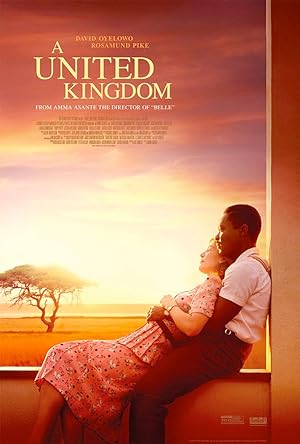Amma Asante, the director of Belle, directed A United Kingdom, a historical drama about a prince who falls in love with a commoner. A United Kingdom’s twist on this conventional story is that the Botswanan prince, played by David Oyelowo, is African, and the commoner is a British woman, played by Rosamund Pike. Add a dash of British colonialism and the influence of neighboring South Africa’s racist apartheid policies, and a fairly mundane marriage becomes an international controversy. If you want to learn more about this story, you should definitely see A United Kingdom.
Because I have a perverse sense of humor, I thought it would be perfect to see A United Kingdom the day after seeing Get Out. Also I want to financially support black female directors, and I loved Belle. I enjoyed A United Kingdom because it told me about a historical controversy that I knew nothing about even though I consider myself to be a well-educated, curious American, but unlike Belle, it told the story fairly straight and only the production value distinguishes it from a TV movie.
I did like that A United Kingdom did not belabor, but had an implicit silent framework of Christianity as revolutionary, breaking boundaries between countries, race and status. The two meet at a London missionary dance, and the pastor encourages British women to socialize with African students. While it is never explicitly referenced, A United Kingdom’s entire premise is Mark 10:9, “What therefore God has joined together, let not man put asunder.” The entire British Empire and South Africa are wrong to try and separate the pair because they are going against God’s word.
I do think that A United Kingdom makes a false equivalence between Europeans’ racist reaction and Africans’ prejudiced reaction to the marriage. To borrow Baldwin’s phrasing in his analysis of The Defiant Ones as shown in I Am Not Your Negro, the European’s hatred is rooted in the irrational terror of the imagination whereas the Africans’ leeriness is rooted in wanting the Europeans to get out of their way (imperialism) and let them cook, which the majority of A United Kingdom shows is a real problem. We know that Ruth would have fallen in love with Sir Seretse if he were not a prince because A United Kingdom showed us that scene, but we are not wrong to worry that it is not an attempt by the British Empire to exploit them once more. (Side note: Pike does an amazing job of getting her face to light up with love every time Oyewelo appears in front of her.)
I was disappointed that the second half of A United Kingdom only briefly focused on Ruth becoming a part of her new community. The real historical figure spent more than one day working before she had to leave for Britain. No one is going to make a song for you for a day’s work at a well and breast-feeding in a circle for one night. Let’s not set the depiction bar so low for a woman who definitely put in the work to adjust to and embrace a whole new way of life. Pike should have been given more to do. Also don’t think that I didn’t notice that there were no women on the council voting. A United Kingdom alludes to women being typecast into a particular political role, submissive and quiet, and implicitly contrasts that with the women in Sir Seretse’s family, but that framework is not challenged in any of his speeches so the calls for democracy feel a bit specious.
A United Kingdom has two terrific and powerful moments. First, I loved the scene when Sir Seretse’s sister is visiting Ruth in the hospital, and the British official wives try to act superior. Know your place. Second, the scene where the British Empire is basically trying to force Sir Seretse’s people to vote for a new leader and have trotted out all the pomp and circumstance. Take notes, Democrats.
While I enjoyed A United Kingdom because I felt enriched to learn more about the world beyond my borders, the past year has a plethora of films that take conventional plots and find a way to create a subversive meaning within the text, but A United Kingdom just plays it straight.
Side note: a black woman made a movie celebrating a famous historical interracial relationship between a black man and a white woman. Can we stop assuming that black women are angry when a black man marries a white woman so I can resume being indifferent, and my silence not be interpreted as being disgruntled? I don’t want to have to throw a party just to prove that I don’t care. I’m this indifferent to all relationships. I’m happy that you’re happy, and if you catch me scowling, you probably caught me at the exact moment that I realized I ate the last fry or I actually don’t have change for $5. I’m not the enemy.
Stay In The Know
Join my mailing list to get updates about recent reviews, upcoming speaking engagements, and film news.





